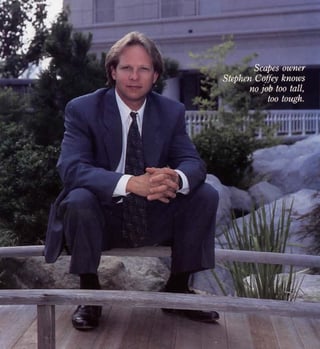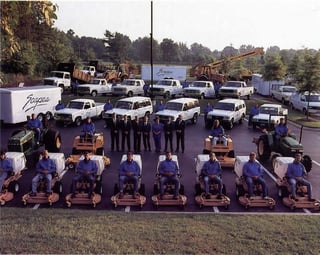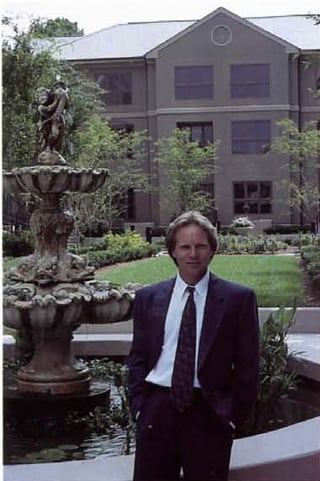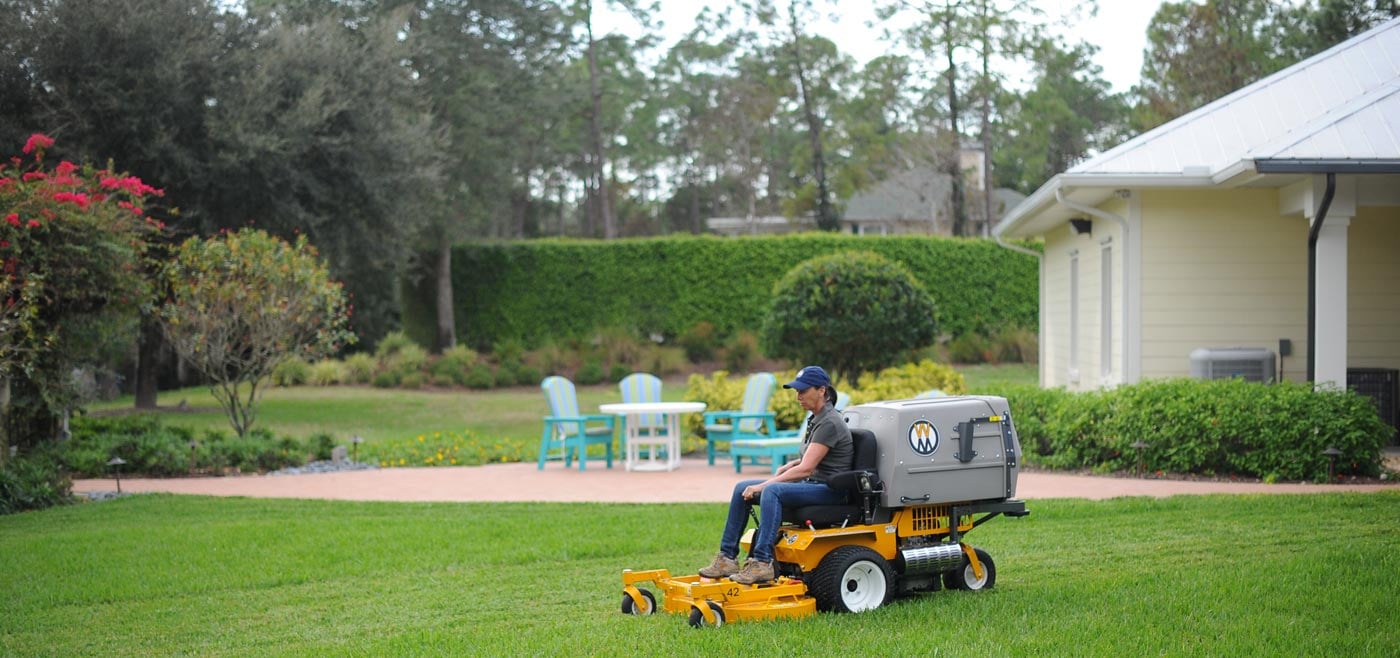Steve Coffey is not your ordinary landscape contractor. Sure, he does installation and construction, and he maintains the majority of the projects his crews complete in the Atlanta area. Yet, in many ways, he stands head and shoulders above the competition. His company Scapes not only does quality work, it does much of it overlooking the streets below.
Rooftops of parking garages, apartment complexes, condominiums, hotels and especially giant office complexes are fair game for Scapes. In Atlanta since the '80s and in landscape construction and maintenance since the mid-'70s, Steve has earned a reputation as the one to call for "on-structure" plantings.
And you have to believe installing and maintaining landscapes stories and maintaining landscapes stories above the ground floor is a different kind of challenge for a landscaper. How does the soil get there? And the trees, they don't grow naturally on rooftops, do they? Not to mention mowing the grass and maintaining the plantings once installed.
 Talking with Steve, you get the impression no challenge is too tall. He has countless horror stories about tower cranes being torn down just as his crews were ready to use them to "hoist soil. " One job required his crews to shore up the parking garages below before they could drive a crane on the roof above. They had to shore it up during the weekend when there was no traffic. Take the shoring down. Then reshore it after the job was done, again on the weekend.
Talking with Steve, you get the impression no challenge is too tall. He has countless horror stories about tower cranes being torn down just as his crews were ready to use them to "hoist soil. " One job required his crews to shore up the parking garages below before they could drive a crane on the roof above. They had to shore it up during the weekend when there was no traffic. Take the shoring down. Then reshore it after the job was done, again on the weekend.
The minimum setup charge for a crane on one job was $15,000. There are countless other challenges, like making sure the right soil is mixed properly so a roof area doesn't exceed weight limitations. "Just one collapsed section over a ballroom and you'll never get insurance again," he relates.
This is Steve's 17th year in the landscaping business. Scapes last year had total sales in excess of $5.5 million. The company has won some major installation and maintenance awards and just last year, its resourceful owner was named businessman of the year for Cobb County. Yet Steve doesn't take anything for granted, in part because his memory of the rocky road to the top is still very vivid.
Born and raised in Detroit, in an environment where working on cars and other mechanical devices was a birthright, Steve's mind infrequently, if ever, turned to green plants. After high school he became a machinist and used his free time to tear apart anything with an engine and a transmission. He moved to Knoxville, Tennessee, in the early '70s to be near his dad. Again, he put bread on the table as a machinist. Two layoffs later and an uncertain future forced him to look elsewhere for work.
I helped a church acquaintance named Wilbur mow a couple of lawns one day," Steve recalls. "It took me 20 minutes to mow and trim each of them When Wilbur told me he made $5 for each yard, the gears in my head start to tum. That was more than I ever made per hour and I could do three an hour."
That was the humble beginning of Scapes. By the spring of the 1976 season in Knoxville, Steve, with a push mower hanging out of the back of his Triumph Spitfire, had grossed $12, 000 mowing lawns. The figure jumped to $58,000 the next year, $139,000 the year after that and $248,000 a year later.
The World's Fair in Knoxville really provided the boost to Steve's fledgling operation. For two years his crews worked to help prepare the grounds, with employee rolls swelling to 16 at the peak. The day the fair opened, though, was the last day of new work for installation contractors.
Seeing the handwriting on the wall, Steve moved his company to Atlanta where he was already involved in a couple of projects. Timing was everything, again. He moved in just prior to the building boom. Once established, the door was wide open for the young, growing company.
"We had more work than we knew what to do with," Steve relates. "The downside, I didn't know when to say no. We quickly overextended ourselves. One year we grossed over $6 million. We also lost money that year."
The boom days taught Steve a lesson in business management. He quickly pulled back to $4 million in sales. Growth is more planned and steady now, he emphasizes, pointing out that between their Washington, D. C., office and Atlanta, they still have yet to reach the dollar volume of the boom days. Yet, financially, Scapes is much better off today, during a time when Atlanta is still recovering.
Hard lesson
The boom years taught Steve the importance of knowing, measuring and controlling costs . He compares those "wild" years in '84, '85 and '86 to a basketball team playing without the benefit of a scoreboard.
"Without knowing the score, a basketball team doesn't know how hard to play or what strategies to use. We were operating in the same void because we didn't have a way to measure our performance." Not anymore, Scapes' managers receive two reports - one on installation and one on maintenance - on a regular basis.
Maintenance reports contain similar data, minus the materials. Daily reports, however, are unnecessary since lawns are maintained only once a week.
 Competitive edge
Competitive edge
When the Atlanta construction boom collapsed, Steve and his managers projected slower growth on the installation side and more growth in maintenance. Unfortunately, competitors projected the same. Steve had to find ways to make both his installation and maintenance side of his operation more competitive.
Job type, job size and equipment all play a role in helping Scapes separate itself from the competition.
Scapes, for example, is only one of a few companies in the area specializing in "on structure" plantings. And even one of fewer still to do big projects that require the contractor to be bonded.
"Big may not always be better," explains Steve. "But I like the big projects. Fewer and fewer companies are able to compete in that market."
With his mechanical background, Steve believes in Scapes' personnel repairing and servicing their own equipment. He's also a frustrated inventor who's constantly on the prowl for better, more efficient ways to get the job done. "It frustrates me that so few companies design and manufacture equipment specifically for landscapers," he laments. "When it comes down to machines for digging and pushing dirt, we have to borrow from the ag industry and heavy construction industry. In many ways, we are still forced to move dirt the old-fashioned way, by hand."
Since Scapes' business is 50/50 construction/maintenance, Steve spends equal time trying to find and buy efficiencies for maintenance crews. He remembers one day in particular in D.C. watching employees mowing with intermediate walk mowers.
"The temperature was over 95 F, and it was humid. I asked the division manager how fast they were walking. He told me about 4 mph. It didn't take me long to figure they were walking between 35 and 40 miles a day. No wonder employee turnover was high, not to mention a natural loss of productivity as the day wears on."
Upon his return to Atlanta, Steve bought his first Walker mower. And eventually he replaced all of his intermediates, except for a few that are used for steep hills.
"I tried Walkers out when we were thinking about replacing the intermediates. But they appeared too small for our projects. But we tried them again. Our intent was to find a mower that would do the terraces in front of our biggest project, North Park. The Walker was the only one able to accommodate the rolling terrain and tight turns."
The Walkers had some other surprises in store for maintenance crews. They were compact enough to fit in North Park service elevators. Crew members drove them into the elevator, rode them to the roof and proceeded to mow the large grass strips.
"Before trying the Walkers, we were using small push reel mowers," Steve relates. "After we tried the Walkers on the roof for the first time, the building manager asked us to continue using the new machines because they left a great-looking cut.
"That was a win, win situation for both of us. For us because it cut down our mowing time. For him, because he liked the look of the cut."
"We found, too, the Walkers were small in appearance, only. They were able to do all but our biggest jobs. Now we own eight of them."
 Winning combination
Winning combination
Win, win is truly the nature of the game in the landscape/lawn maintenance market, today. Steve explains that to go into a new job with one party holding an advantage will eventually cause a problem.
The ideal situation, he adds, is to be able to make a fair price on the job, and give the client value added. And the only way to be able to afford to do that is to know what your costs are and do the jobs in the most efficient manner possible. Not surprising, one of his pet peeves is the contractor who, like himself a few years back, doesn't understand costing.
"The first year you're in business, you can make a buck because equipment is new. Trucks, trailers and mowers will have little downtime. The second year you make a little less because there will be more repairs. The third year, you might lose money. The fourth year, you lose a lot of money."
The point is, he continues, whether you're a lawn maintenance operator or landscaper or both, you also have to be a business person, too. You have to do quality work, do quality work efficiently, give your clients the best possible service, anticipate your costs and plug them in. After all, trees can grow on roofs, but money doesn't grow on trees.




 Site Search
Site Search



